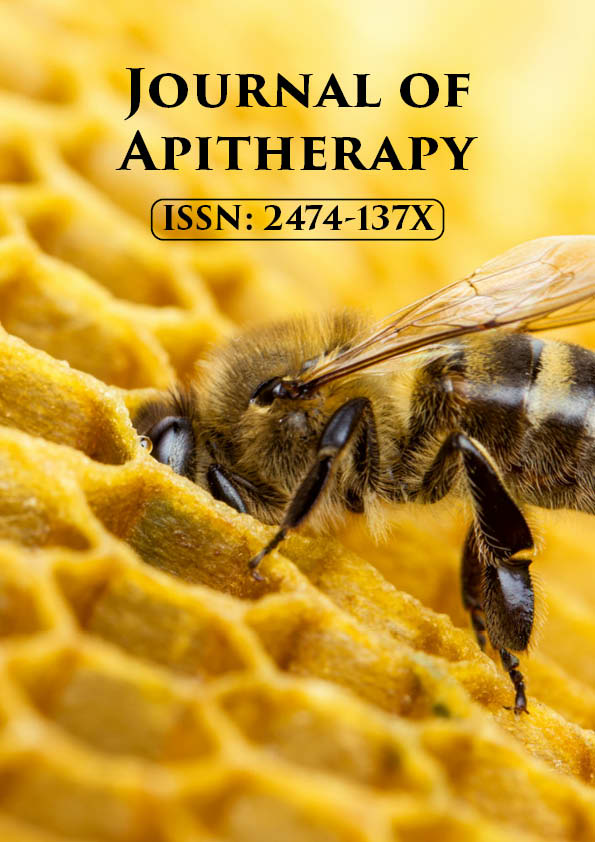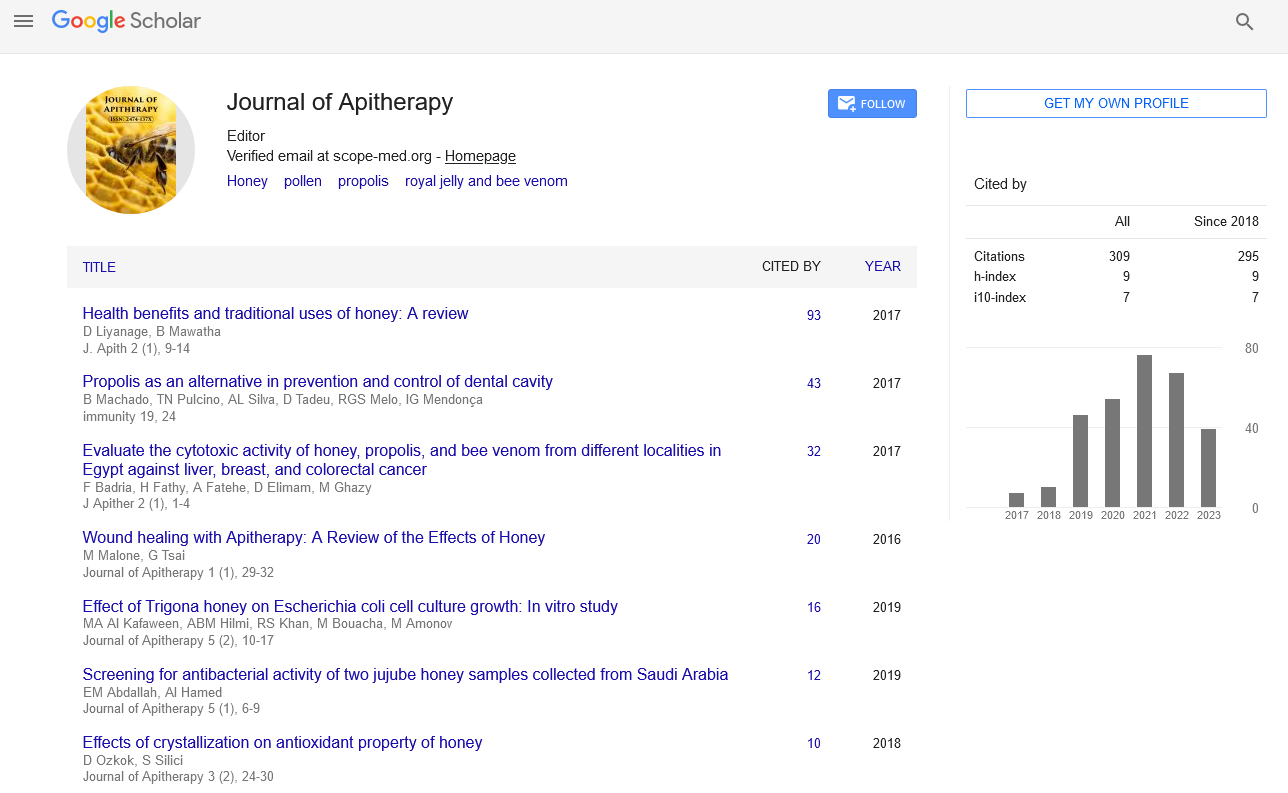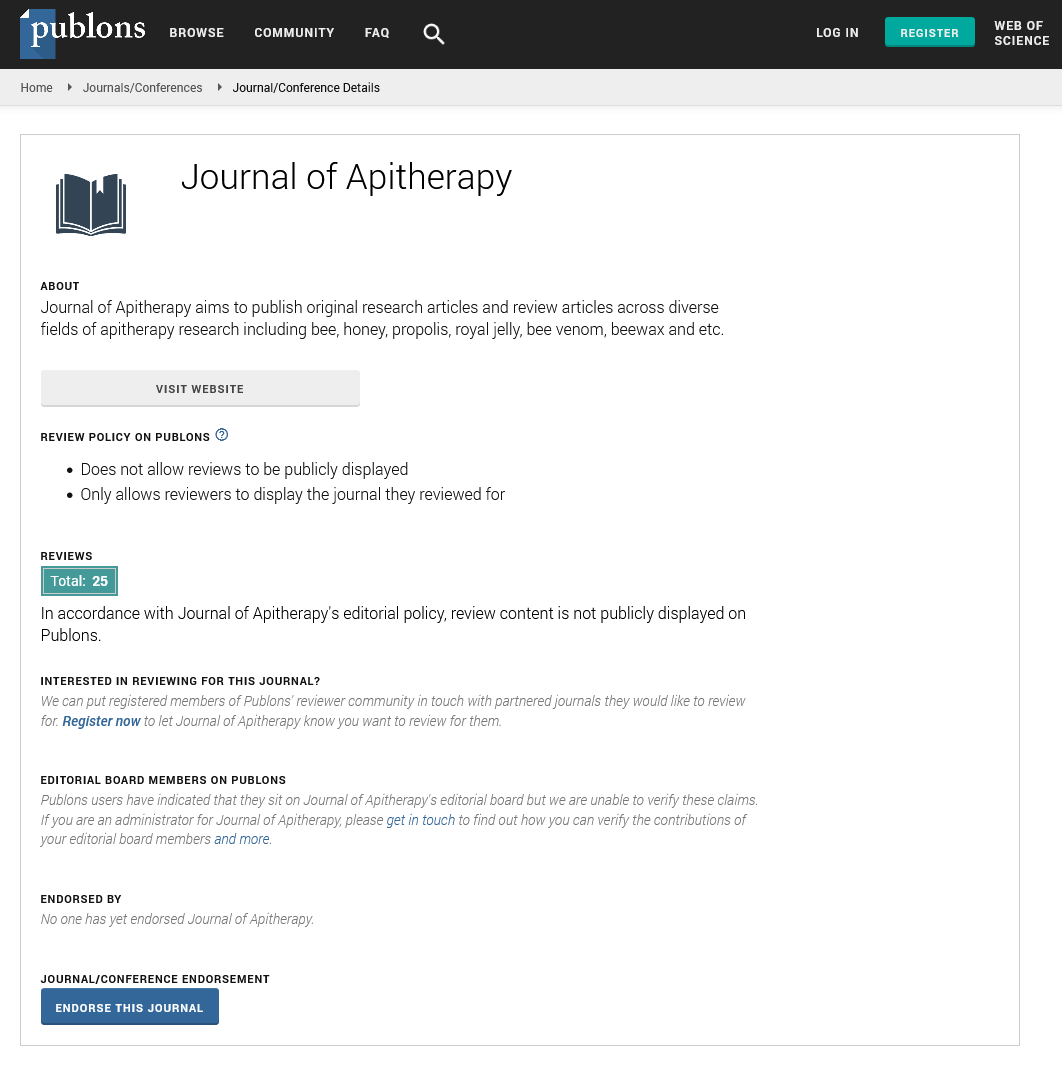Perspective Article - Journal of Apitherapy (2023)
The Healing properties of Bee Products
Etil Guzel*Etil Guzel, Department of Pharmacognosy, Yeditepe University, Istanbul, Turkey, Email: etil.ariuenu@yeditepe.edu.tr
Received: 03-Jul-2023, Manuscript No. Japitherapy-23-110033; Editor assigned: 06-Jul-2023, Pre QC No. Japitherapy-23-110033 (PQ); Reviewed: 20-Jul-2023, QC No. Japitherapy-23-110033; Revised: 27-Jul-2023, Manuscript No. Japitherapy-23-110033(R); Published: 03-Aug-2023
Description
Bee products, a diverse array of natural substances harvested from the industrious world of bees, have captivated human interest for centuries. These remarkable offerings, created through the intricate processes of pollination and hive activity, carry a plethora of nutrients, bioactive compounds, and therapeutic potential. From the golden sweetness of honey to the multifaceted benefits of royal jelly, propolis, bee pollen, and beeswax, bee products stand as a testament to the intricate relationship between nature and human well-being.
Bee products
Honey: Honey, the most recognizable of bee products, is a liquid gold brimming with nutritional and medicinal value. Produced from the nectar of flowers, honey is not only a natural sweetener but also a source of antioxidants, vitamins, and minerals. Its antibacterial properties have been revered for wound healing and soothing sore throats. Different types of honey, such as Manuka honey, have gained recognition for their unique healing properties, especially in the realm of wound care and microbial infections.
Royal jelly: Reserved exclusively for the queen bee, royal jelly is a highly nutritious secretion that nurtures her growth and longevity. This potent substance is rich in proteins, vitamins, and fatty acids, making it a sought-after dietary supplement. Research suggests that royal jelly may offer a range of potential benefits, from enhancing immune function to promoting skin health and even exerting anti-aging effects through its regenerative properties.
Propolis: Bees use propolis, a resinous substance collected from plant buds and bark, to seal and protect their hives. This “bee glue” possesses impressive antimicrobial, antifungal, and anti-inflammatory properties, making it a valuable substance for human health. Propolis has been explored for its potential in wound healing, oral health, and even as a complementary treatment for certain types of cancer. Its diverse composition, including flavonoids, phenolic acids, and essential oils, contributes to its therapeutic potential.
Bee pollen: Bee pollen is the pollen collected by bees as they forage for nectar. Often referred to as a “superfood,” bee pollen is a dense source of nutrients, including proteins, vitamins, minerals, and enzymes. Advocates claim that it can boost energy, support the immune system, and aid in digestion. However, due to potential allergenicity, cautious consumption is advised, especially for individuals with pollen allergies.
Beeswax: Beeswax, produced by young worker bees, serves as the building material for honeycomb cells. This natural substance has a multitude of applications, from candles and cosmetics to skincare products and even as a food-safe coating. Its emollient and protective properties make it a popular ingredient in moisturizers and lip balms. Beeswax also offers an eco-friendly alternative to synthetic materials in various industries.
The utilization of bee products goes beyond traditional culinary and medicinal uses. They have expanded into the realms of cosmetic formulations, pharmaceutical research, and even sustainable practices. However, ethical considerations are paramount, as responsible sourcing and preservation of bee populations are crucial to ensure the continued availability of these natural treasures.
In recent years, scientific inquiry has further unraveled the bioactive components of bee products, shedding light on their mechanisms of action and potential therapeutic applications. While anecdotal evidence has long celebrated the virtues of these gifts from the hive, rigorous research is gradually validating their claims and paving the way for evidence-based integration into mainstream health and wellness practices.
In a world where synthetic compounds often dominate the health and beauty industries, the resurgence of interest in bee products represents a return to nature’s wisdom. From the humble beginnings of pollinating blossoms to the intricate processes within the hive, these remarkable substances offer a holistic tapestry of health and well-being. As science continues to explore their depths, bee products remain a testament to the harmonious interplay between the natural world and human health.
Copyright: © 2023 The Authors. This is an open access article under the terms of the Creative Commons Attribution Non Commercial Share A like 4.0 (https://creativecommons.org/licenses/by-nc-sa/4.0/) This is an open access article distributed under the terms of the Creative Commons Attribution License, which permits unrestricted use, distribution, and reproduction in any medium, provided the original work is properly cited.







